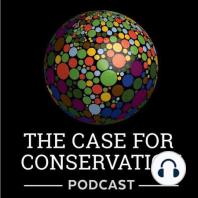59 min listen

21. How can we better understand environmental change? (Timm Hoffman)
21. How can we better understand environmental change? (Timm Hoffman)
ratings:
Length:
51 minutes
Released:
Apr 4, 2022
Format:
Podcast episode
Description
In 1975, biologist Paul Ehrlich said that 90% of tropical rainforests would be lost by about 2005. Although their loss has continued at a steady rate, by 2019 the figure was more like 32%. Also in the 1970s, ecologist Kenneth Watt forecast a world 11 degrees colder in the year 2000. Of course, it’s been well publicized that the trend is in the opposite direction, and at a less severe pace. At a more modest scale, botanist John Acocks predicted in the 1950s that South Africa's Karoo (a desert-like area the size of present-day Germany) would expand into neighboring ecosystems, amounting to the desertification of millions of hectares of the country. As you’ll hear in today’s discussion, the Karoo in fact appears to have decreased in size. There are plenty of other examples of predictions of environmental change proving to be completely wrong. Perhaps those making the predictions didn't spend enough time looking into the past in order to forecast the future; and perhaps they didn't consult a diverse enough pool of expertise to inform their predictions.Timm Hoffman is a professor of plant conservation at the University of Cape Town (UCT) who, for decades, has used a variety of techniques to understand changes in biodiversity and landscapes. I have long admired Timm for the humility with which he approaches this subject. We talk about the methods he uses, especially repeat photography, and about the role of community engagement. And Timm argues that an interdisciplinary approach to ecology and conservation is likely to give us the best idea of what is going on. This episode is focused on southern Africa, but I’m sure you’ll find the lessons universally applicable.Links to resources:Before the Beginning: Cosmology Explained - Book on scientific thinking by UCT emeritus professor, George Ellis, which was an early inspiration for Timm.Plant Conservation Unit - The Institute that Timms heads at the University of Cape Town Re-thinking catastrophe? Historical trajectories and modelled future vegetation change in southern Africa - Paper Timm co-authored in the journal, Anthropocene, which found that evidence of the projections for the climate and vegetation of the subcontinent is so far inaccurate. Institute for Poverty, Land and Agrarian Studies - The institute co-founded by Timm's collaborator, Ben Cousins, which "does research, policy engagement, teaching and training about the dynamics of chronic poverty and structural inequality in Southern Africa.Time stamps:02:35: Are conservationists too confident in their assumptions about environmental change?04:40: Timm's experiences that have informed his points of view including the influence of disciplines and people outside of conservation19:04: How do communities feel about researchers?24:10: Community photo project25:38: What is repeat photography?32:20: How to define degradation or improvement in the landscape43:41: How communities help to fill knowledge gaps45:47: Loss of traditional knowledgeVisit www.case4conservation.com
Released:
Apr 4, 2022
Format:
Podcast episode
Titles in the series (45)
1. Is the conservation message getting through? (Tim Hirsch) by The case for conservation podcast